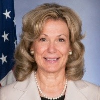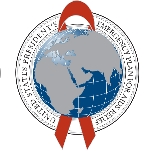Officials
Offical

Deborah L. Birx, who started studying the HIV virus in the early 1980s, was confirmed on April 4, 2014, to be head of the President’s Emergency Plan For AIDS Relief (PEPFAR) and an ambassador-at-large.
Birx comes from a scientifically-oriented family. Her father, Donald, was a mathematician and electrical engineer and her mother, Adele, was a nursing instructor. One brother was a mathematician and the other a nuclear physicist. Birx earned her B.S. in chemistry at New York state’s Houghton College in 1976 and went on to Penn State’s Hershey School of Medicine, earning her M.D. in 1980. She also went into the Army at that time and did her residency at Walter Reed Army Medical Center.
Birx’s specialty was immunology, concentrating on allergies at first. She found herself as a victim of an allergy in the 1980s when she ate kiwi fruit on an airplane and had an anaphylactic reaction severe enough that the plane had to land to get her emergency treatment. Ironically, Birx was on her way to a convention of allergists when the incident occurred.
But in the early 1980s while participating in a fellowship sponsored by Walter Reed and the National Institutes of Health, Birx began to be consulted on patients with what became known as HIV. Her early knowledge of the disease may have saved her life. While giving birth to her eldest daughter in 1983, Birx had complications, but told her husband not to let the doctors give her blood. They didn’t, and the blood that Birx would have received was later found to contain HIV.
Thus, she began a long career of searching for a cure for that disease. From 1985 to 1989, Birx was assistant chief of hospital immunology services at Walter Reed. She moved to the Department of Retroviral Research, first as assistant and in 1994 as head of the department. Beginning 1n 1996, as director of the U.S. Military HIV Research Program, Birx helped lead the RV144 vaccine trial, which took place in Thailand between 2003 and 2006, considered to be the first vaccine trial that showed a lowering of the HIV infection rate.
Birx has spent much of her career working in Africa, beginning in 1998 to set up trials there. In 2005, Birx moved to the Centers for Disease Control and Prevention as director of its Division of Global HIV/AIDS in the Center for Global Health. She held that post until being appointed to lead PEPFAR. She retired from the Army in 2008 as a colonel.
Birx has two adult daughters, Devynn Birx-Raybuck and Danielle Birx-Raybuck.
-Steve Straehley
To Learn More
Six Prominent Women Scientists Making a Difference in the AIDS Fight (by Mary Rushton, IAVI Report)
- Latest News
- D.C. Public Schools will Teach all Second-Graders to Ride a Bike
- New Rule in Germany Limits Sales of Sex-Themed E-Books to 10pm to 6am
- What Happened to the 6-Year-Old Tibetan Boy the Chinese Government Kidnapped 20 Years Ago?
- U.S. Ambassador to Turkey Photoshops his Hair Color to Mock Turkish Mayor
- Mystery Artist Calls Attention to Unfixed Potholes by Drawing Penises around Them





